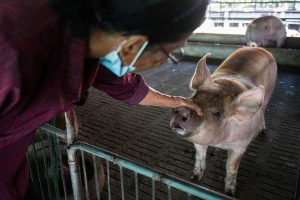THE Department of Agriculture (DA) said on Tuesday that it expects the African Swine Fever (ASF) to wind down ahead of the launch of vaccine trials.
“The ASF issue could gradually be resolved… by the end of the year,” Agriculture Secretary Francisco P. Tiu Laurel, Jr. said in a post-SONA discussion on Tuesday.
President Ferdinand R. Marcos, Jr., in his State of the Nation Address on Monday, said that the government is ready to roll out vaccines against ASF which has decimated the hog herd.
Twenty municipalities across nine provinces had active cases of ASF as of July 12, according to the Bureau of Animal Industry.
The DA has said that the vaccine approved by the Food and Drug Administration was sourced from Vietnam.
“ASF is really a big problem… and one solution to this is (increased) biosecurity. But biosecurity alone is not enough,” Mr. Laurel added.
Another DA program is known as Integrated National Swine Production Initiatives for Recovery and Expansion (INSPIRE) aimed at repopulating farms in ASF-hit areas.
Under the modified INSPIRE program, repopulation will now focus on the construction of multiplier facilities and the use of artificial insemination.
Mr. Laurel said that the DA is ready to implement the vaccine trial by September.
“Hopefully, by September… we will vaccinate (the) red zones and yellow zones,” he added, referring to the classification system for the most intense outbreaks.
The DA has allocated about P350 million to procure ASF vaccines for a government-led trial.
“After six months of the trials, if everything is okay and there are no problems, then I think it will be released for commercial use,” he said.
Asked to comment, Leonardo Q. Montemayor, chairman of the Federation of Free Farmers, said the government should be cautious in using the Vietnam vaccine.
“Very few (1% or less) Vietnamese farmers reportedly use the vaccine,” Mr. Montemayor said via Messenger chat.
Samahang Industriya ng Agrikultura Executive Director Jayson H. Cainglet said that the controlled trials will be fully supervised by the DA, unlike previous vaccine trials.
“We support the earlier announcement of the DA of controlled vaccination trials so there would be strict monitoring of all field trials; unlike the previous trials where the importer had the full control,” he said via Viber.
Mr. Laurel added that the Q fever cases detected recently are limited and easily treatable with available animal medicines.
“Limited areas lang (only) at mukhang madaling gamutin (it seems to be treatable) with the available medicines we have in the Philippines,” he added.
Last month, the DA confirmed the first cases of Q fever, leading to a cull of infected goats.
The BAI had said it detected Q fever in some goats at a government breeding station in Marinduque and a quarantine facility in Pampanga.
The DA said that the culled goats infected by Q fever, which is caused by the Coxiella burnetii bacteria, were imported from the US.
“The findings now, after we talked to the USDA and looked at all the records, it seems that the goats got sick here… but we are still validating,” he said.
Mr. Laurel added that Q fever cases seem to be “isolated” as further tests in another area produced no positive findings.
Q fever is transmissible to humans. Infected people have flu-like symptoms, such as body aches and headaches. — Adrian H. Halili
